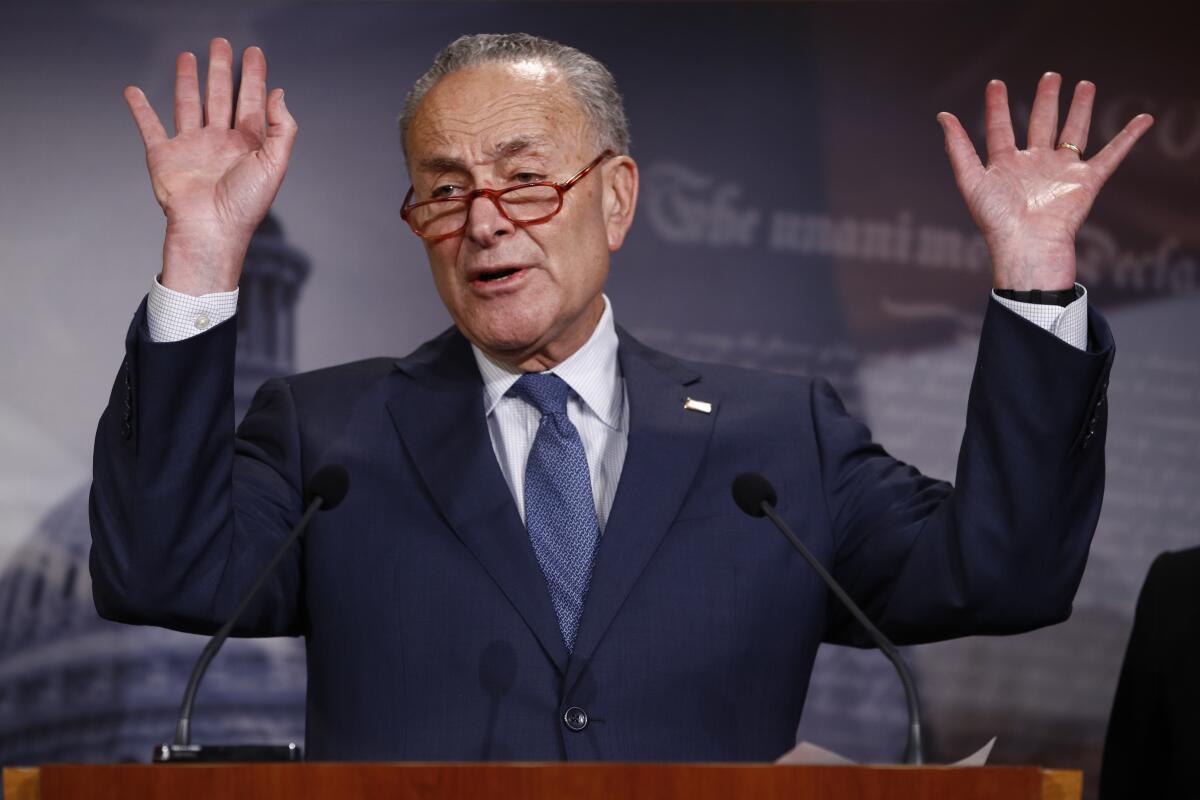Mitch McConnell reminds us why the Senate needs to kill the filibuster

- Share via
Considering how little the contemporary version of the U.S. Senate accomplishes, that may be reason enough to kill the filibuster — a tool used by the minority party to keep the Senate in a state of near-perpetual obstruction.
But here’s another reason. Despite an enormous amount of work to be done now at the start of a new Congress, the Senate can’t accomplish tasks as basic as picking committee chairs because Minority Leader Mitch McConnell (R-Ky.) is using the threat of a filibuster to hold up the rules organizing the new Senate, which is split 50-50, with Vice President Kamala Harris’ tiebreaking vote giving Democrats a razor-thin majority. Why? Because McConnell wants a guarantee that Democrats won’t bend the rules … to eliminate the filibuster.
“It’s an absolutely unprecedented, wacky, counterproductive request,” tweeted Sen. Brian Schatz (D-Hawaii). “We won the Senate. We get the gavels.”
And yet it was utterly consistent with the way the filibuster has been deployed in recent years. According to Senate records, the number of times the chamber considered a “cloture” motion to end debate — the Senate’s way of stopping a filibuster — rose from six in 1969-70 to 298 in 2019-20. That’s almost one filibuster vote per day the Senate was in session. Once a last-ditch resistance effort by a stubborn minority, the filibuster is now so routine, cloture votes are held on almost everything the Senate considers.
Previous Senate majorities of both parties defanged the filibuster to help them confirm nominees by a president from their party. And so far, the ship of state has not capsized. But defeating a filibuster on a proposed law or spending bill still requires 60 votes, which has allowed the minority party to not just obstruct major pieces of a president’s agenda but also to prevent the Senate from even debating them.
Progressives have been saying for months that if Democrats won control of the White House and the Senate while keeping control of the House, they should kill the filibuster to keep Republicans from blocking legislation needed to address the multiple crises facing the U.S. In their minds, it is the only way to allow for bold action to reduce greenhouse gas emissions, narrow income inequality and tackle other progressive priorities.
Democrats did, indeed, win the White House and majorities in both chambers of Congress, albeit wafer-thin ones. But if they think that eliminating the filibuster will give them the keys to the policy kingdom, they’re missing the point.
Eliminating the filibuster will empower Republican majorities just as surely as Democratic ones. So it’s silly to think that changing Senate rules would favor one party’s agenda over the others. Any such advantage would merely be temporary.
The real effect would be to get Congress legislating again and to let voters hold lawmakers accountable for their actions, or inaction. Too often, major policy issues that should be worked out by lawmakers debating and compromising in committees and on the floor are punted to the executive branch. That’s one reason for the policy whipsaw epitomized by President Biden signing a series of executive orders in his first days in office undoing many of President Trump’s executive orders.
It’s also magical thinking to believe that the filibuster is the only thing holding back the Green New Deal, “Medicare for all” and other major items on the progressive agenda. With 50 Republicans in the Senate, Democrats have to be united in order to pass anything that Republicans strongly oppose. And Democrats are not so united. In fact, chances are slim that they can find 51 votes to circumvent the filibuster, given that at least one Democrat — Sen. Joe Manchin of West Virginia — has said he opposes such a move.
Rounding up even a simple majority on consequential bills that have broad effects on the population or the economy won’t get any easier if the filibuster hurdle is removed. And that’s a good thing. Legislation crafted with bipartisan support has staying power; measures passed by the majority party alone can become enduring targets for partisan attacks, as the Affordable Care Act illustrates.
It may be a naive hope, but removing the filibuster could also prod more lawmakers to cross party lines to create shifting majorities that pursue incremental solutions to deeply divisive problems. Take, for example, the relatively high bipartisan support for helping the undocumented immigrants known as Dreamers, and the growing bipartisan interest in raising the price of carbon to help lower greenhouse gas emissions. These smaller steps could and should be enacted while work continues to achieve broader consensus on more ambitious immigration and environmental legislation.
Despite the shameful history of the filibuster — Southern Democrats famously used it to block civil rights legislation in the Jim Crow era — lawmakers today seem to think they face no consequences for such obstruction. And they probably don’t, at least in the short term. But Congress’ inability to rise above the gridlock has eroded both its power and its reputation, and contributed to the pox-on-both-houses, burn-it-down nihilism born of voter frustration.
Right now, the chamber that calls itself the world’s greatest deliberative body can’t even debate how to arrange itself, all because McConnell wants to stop Democrats from so much as considering an end to filibusters. How embarrassing.
More to Read
A cure for the common opinion
Get thought-provoking perspectives with our weekly newsletter.
You may occasionally receive promotional content from the Los Angeles Times.









